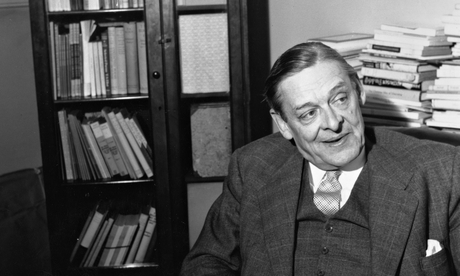
In Murder in the Cathedral, Thomas Stearns Eliot has his namesake and mouthpiece Thomas Beckett say:
"The last temptation is the greatest treason / To do the right thing for the wrong reason."
Eliot may often have been deeply unkind – he had vile views on many topics – but he was never stupid, especially about the moral and rational life. Yet in this, as in so much else in the work I shall be considering in this series, he was speaking a brilliant half-truth.
Eliot – arguably the greatest poetry in English in the 20th century – was so worried that he might be pursuing religious and literary sainthood for his own ego rather than to the greater glory of god, that he forgot ever to consider whether it was even possible or desirable to pursue sainthood at the expense of ordinary kindness and common decency. Throughout his life – and it was a long one, full of great work – he left a trail of human wreckage and hurtful speech. Any account of that work and of the ideas embedded in it has to keep track of the harm he did, not in a spirit of cheap point-scoring, but as an awful warning. Those of us who try to pursue both an ethical life and a creative one find that it is never easy, that it is always needful that we weigh one good against another.
We should never think selfless virtue can be reached by treading on others. The cold splinter at the heart of the true artist must be harsher in its quarrel with the self than it is in its rhetorical engagement with other people. For believers, this is the virtue of humility; I am not sure what the rest of us can call it. What we can agree on is the constant examination of conscience, and, when we fall short, a conscious decision to do better.
Eliot was in love three times, and each of those loves became events in his artistic and spiritual lives – and two of the women involved were massively the worse for it. Vivien Eliot was a difficult woman, yet Eliot – who had connived at her affair with Bertrand Russell – treated her, with the agreement of his spiritual advisers, with a coldness that helped break her spirit, perhaps her mind. Emily Hale was the woman he deserted for Vivien; she spent her life at his encouragement waiting for Vivien to die, and it was in her presence that he had some of his deepest moments of spiritual intensity – yet she was eventually dismissed from his life with equal coldness. They were both central to his greatest works: Vivien to The Waste Land and Emily to much of The Four Quartets.
Two of his closest friends, Mary Trevelyan and John Hayward, were also in due course sent into outer darkness. We are told to forgive our enemies; Eliot could not even forgive those who loved him. In all those cases, Eliot was aware of the harm done, and may even have taken responsibility for it in his heart; what he never did was question the human cost to others of the life he pursued in his quest for genius and sainthood. He would not face the possibility that any God who asked such things of him was not worth his worship.
It is clear that Eliot would have preferred to live in a society in which it was not even possible to ask awkward spiritual questions. He grew up under an austere Unitarianism and moved to a high Anglicanism – not because he disliked the doctrinal certainties of the Catholic church, but because Anglicanism meant he could amalgamate religious certainty with a high Tory monarchism that regarded even the rise of the Tudors as a dilution of the divine right of kings. (He mourned Richard III each year with a white rose in his lapel). His antisemitism was expressed in visceral terms but at root it was free-thinking he thought should have little place in a good society as much as the Jews he identified it with.
As Anthony Julius has demonstrated beyond a shadow of doubt, Eliot used language about Jews that was closely linked both to traditional antisemitic hate speech and to the tropes of the murderous antisemitism of his own time. It is hard to see how this can be reconciled to his Christianity, except because he saw diversity as a threat to his cloistered virtue. Or perhaps I am wrong. Eliot's racism towards African-Americans was expressed in the crudest and most simplistic of doggerel; the antisemitism creeps into, if not his greatest work, at least into work closely allied to it.
And yet, amid the relationships in bad faith and the vile views, Eliot managed to say important and useful things about both the experience of modernity and the mental states which we may as well call "the spiritual life", even if we are sceptical about the existence of spirit. It is important that we read him, sometimes holding our nose, because with all his deep personal flaws – and all the more when we think about them – he remains one of the key writers of his and our time.

